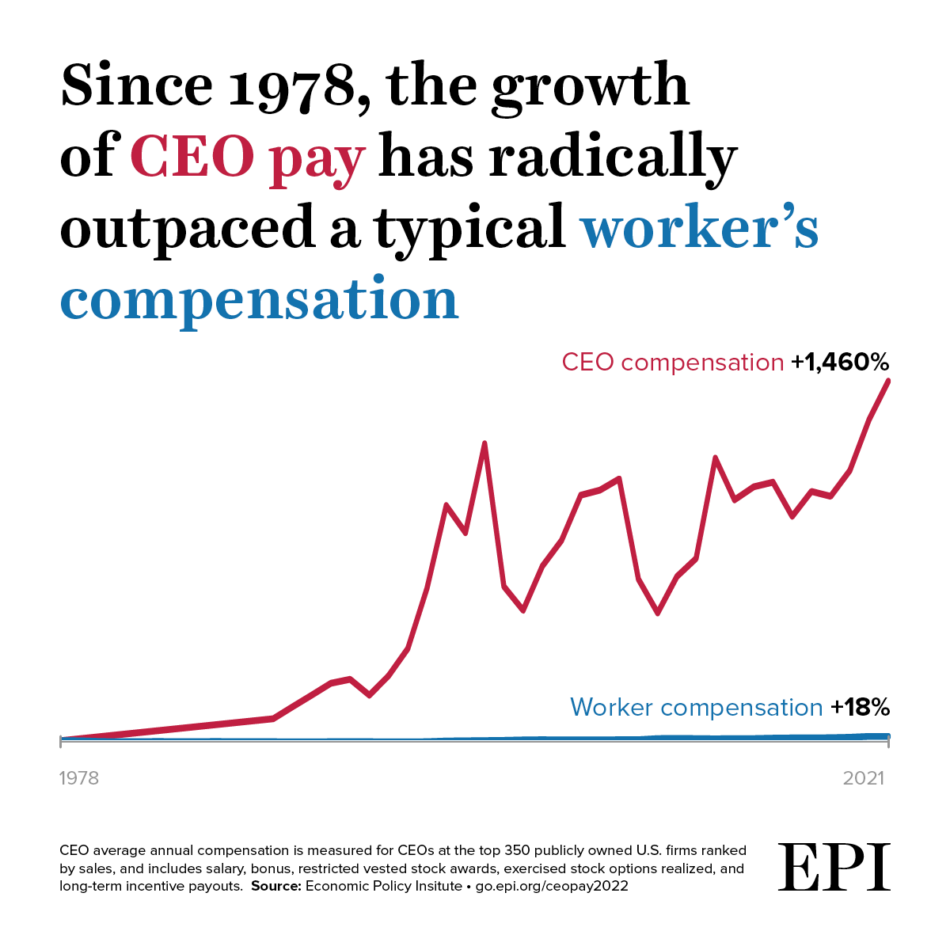- cross-posted to:
- antiwork@lemmy.ml
- cross-posted to:
- antiwork@lemmy.ml
“average top CEO compensation was $15.6 million in 2021, up 9.8% since 2020. In 2021, the ratio of CEO-to-typical-worker compensation was 399-to-1 under the realized measure of CEO pay; that is up from 366-to-1 in 2020 and a big increase from 20-to-1 in 1965 and 59-to-1 in 1989”
The funny thing is, you can remove a CEO, and the company will still keep running. Remove workers and the company can’t function. Looks like “compensation” is going to the wrong people.
You could replace the work of most boardroom executives with a well trained AI tbh.
Not that well trained. Pretty sure SmarterChild would suffice.
In some cases (cough Twitter cough), you can skip the whole software thing and replace the pure silicone of a computer with any slab digged out from the ground.
Pet rock would do less damage for sure.
A board is there to make decisions in their own best interest as key stakeholders. They’re not paid for services.
Similarly, no company of any real size can survive without a CEO because their job is to work with investors and execute a single vision.
Sometimes I feel like no one on this site actually works in a corporation. Like, these roles are defined. You can just look up what these roles exist for if you don’t know.
I think it’s not so much that people can’t look up the roles, but that most people grinding away in a wage-slave role don’t have context for what is actually done at the higher level. They are too insulated from the day to day of those roles which make it easier to write them off wholesale as useless. That being said, CEO compensation across the board is not in line with any actual productivity or effectiveness metrics, let’s be real, and certainly should not be anywhere near as high in comparison to the average employee. But that’s a separate and more nuanced conversation that can’t be solved with a simple “fire all CEOs hurdur” comments that you’ll see online.
I’m all for CEO pay caps, as the CEO market is totally fucked
CEOs often do real work for a company, people who sit on a board don’t. Board directors are often on the boards of several companies, because being on one board alone is not nearly hard enough to qualify being a job in and of itself.
These people rake in money as if each of those board seats were a super job, effectively equivalent to hundreds or thousands of workers, while it requiring no where near the level of effort or expertise that an actual job requires.
Capitalism isn’t meritocratic like pro-capitalists love to believe. Capitalism is a system designed for and by the owner class to protect said property owning class.
If you want a meritocracy, you want a market socialist system. It’ll still have some problems capitalism has by the nature of markets (externalized costs aren’t accounted for by markets), but it’s at least a proper meritocracy when renting humans is illegal like buying them already is.
Yeah worker owned coops still have ceos. They perform a useful role as coordinative support staff. The problem isn’t that you have bosses, it’s that they aren’t accountable to you. They’re treated as face to an oligopoly, but they could instead be the head of a democracy. They also really don’t need that level of compensation
I agree with your entire comment, though I will say that an important part of the democratic process is not only voting, but also debate and discussion.
I think workers should regularly come together to have discussions about the direction and performance of the company, the performance of supervisors, and more, while also having the ability to effect change on those processes through democratic means. This ensures people stay engaged and informed, while empowering them in a way that furthers both their development, and the development of democratic consciousness within the company.
I did say “most of the work of”. I did not say “replace the people of”. I meant only that most of the basic analysis and troubleshooting of a business’ fundamentals could easily be done with an appropriately tailored model.
isn’t making a decision a service?
The CEO is the link between the company and the shareholders.
They get paid by the shareholders to extract as much value as they can from the company to the shareholders.
On the other hand, if the company needs more investment, the CEO is the one who has to attract that investment, too. Otherwise the company will stall or go bankrupt.
deleted by creator
A company that makes a 0$ profit and 0$ loss should be considered a successful one. Such a company would manage to pay all its costs (including wages, r&d, etc.) and function at peak efficiency.
I disagree. Some profit is good. It allows you to keep a coffer so you can keep afloat in bad years, as well as to buy back stocks for the employees. Once employee owned any profit can be voted on to either be added to budgets or distributed out amongst the employees.
Year over year growth is completely unsustainable. They should be content with making healthy profits in good times, and making any profit at all during times of recession.
If you can’t keep your business afloat on its own, if you require injections of cash from investors to avoid bankruptcy, that business should fail. And there’s nothing wrong with a business stalling, in my view. There should be limits to growth.
This is the right answer.
Investors are primarily for M&A when brought on late.
Investors brought in early still deserve a day, because it is partially their company.
In the US there’s a legal obligation to the shareholders, it’s not just as simple as a sick owner culture trumpeting platitudes. To fix this problem we need to address both the culture and the legal frameworks: https://corpgov.law.harvard.edu/2019/02/11/towards-accountable-capitalism-remaking-corporate-law-through-stakeholder-governance/
The problem is these people in the top positions don’t see anything wrong with this.
I remember telling my republican friend that companies could easily raise worker pay. He laughed said that hamburgers would cost $20. I said you don’t need to raise the price of the product, the people at the top could make less money. He then said “Oh, they are NOT going to do that.”
He laughted said that hamburgers would cost $20.
They always say this, but when you mention the Nordic countries where wages are at least twice ours and fast food is pretty much the same cost, they start ranting about how any country that properly uses socialism doesn’t count.
And they almost always end up saying something racist
properly uses socialism
You’re describing privately-held companies paying their employees well, not socialism.
No, they are describing a government that enforces and enhances labor rights and protections.
It’s the same picture from 2 angles.
In no way is that socialism.
Right, but the hypothetical person this person is talking to fires back with “that Nordic country doesn’t count cause that’s socialism”
I’m a Florida native so I’ve had this conversation with someone, and they’re implying the reason why burgers aren’t $20 is because of some weird centralized control of prices while also conflating social programs with socialism (and not the economic system)
Well, helping those people realize that the government can do shit and it not be socialism, because words have actual meanings, is a great way to get them to stop voting against their own self interest, imo.
It’s why I constantly die on this hill on this site to people who think universal healthcare is socialism, and call themselves socialists as a result.
You are absolutely correct.
I also want to point out, that to those people socialism is when government does ‘bad’ things like helping the poor. When they ban abortions, it’s job well done.
Well of course they don’t see anything wrong with this, they’re getting paid not to see anything wrong with it. They’re paid astronomical amounts of money to keep the status quo by people even richer than them.
Oh, they are NOT going to do that.
He’s not wrong and that’s issue.
I mean, hamburgers already cost around $10-$15 anyway… and that’s without workers getting a pay increase
Cutting CEO pay would not affect worker pay that much.
Fortune 500 CEOs make, on average, about 17MM a year. The average Fortune 500 company has 52k employees.
If you split their entire paycheck among just the bottom 50% of employees you’re looking at like $3 per hour. That’s… okay. But now you don’t have a CEO, and this isn’t really sustainable with any sort of inflation.
If you instead raise prices one cent on whatever product or service, you almost certainly will have more money to divvy up among employees, and it’s sustainable.
Worth noting I’m for a federal cap on CEO pay but that’s more to address the runaway nature of the CEO market, and its downstream effects.
Giving everyone a $3/ hr pay bump from eating an overpaid CEO sounds like a pretty great start
But now you don’t have a CEO
Added bonus!
Except in the real world that is not a bonus.
I think your decimal may be off. For full time work, looks like ~36 cents per hour, assuming full time. But, for many it would be even worse. For Walmart, completely eliminating the CEO pay could increase the bottom 50% earners annual income by a whopping $22.
I agree with the overall sentiment tho. More than what this article shows, I’d be interested to see the percentage and dollar amount increase in disposable income among various cohorts within the top 10 percent incomes.
But guys, just imagine what that’s going to do for us when it starts to trickle down… like any minute now…
Nope, still just piss
Meanwhile, you have CEO’s doing shit like that talk that spread around this week where he shat on workers for lord knows how long.
And the ex-EA Unity CEO who decides to tank his company overnight.
Worth every cent …
exactly
Feudalism never went away, it just changed its name.
capitalism has become economic slavery
Yeah, but look at how much Elon Musk tweets/xcretes/whatever. He’s obviously doing 1,460% more work than anyone else at Twitter.
xcretes
this has got to be a thing.
Someone gotta make the content for xhitter
Eat the rich.
compare to only 273% (and ~ six tenths) for the federal minimum wage since jan 1, 1978 (was $2.65, is $7.25). it would be ~ $39/hr if it increased at the same rate at CEO pay over that time frame.
Eat the rich.
ALIVE.
Obviously, I’m not a monster.
Alternative analysis for the WSJ: CEOs endure crisis after crisis - CEOs pay has shown massive cuts on several occasions in the last few years. While average workers salaries have steadily grown in the last 45 years, the pay of CEOs has been regularly affected by enormous cuts, sometimes as much as 45℅.
Bozo McGill, representative for the CEOs in distress: “maybe it’s time to stop caring about the poor. Let’s reduce taxes for the CEOs, otherwise they won’t afford a Lambo a month anymore”
Do those valleys correspond to surges in small startups?












